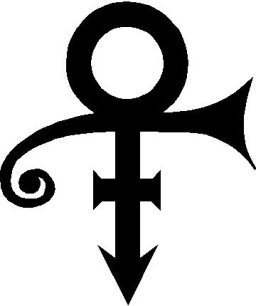
 |
Can anyone tell me what this means?
|
It`s not a Japanese or Chinese character at all.
It looks like some kind of brand mark, and not something with meaning in any language. |
Actually, it looks a lot like "koi", the kanji for love:
 just...a very, very liberal design, lol |
Quote:
It`s not a stylized character, it`s simply not Japanese or Chinese. I can`t say I`m familiar with every language out there, but I am willing to guess it probably isn`t a real character at all. It makes me think of the weird character Prince used more than anything in Japanese or Chinese. |
I dunno, I'm almost willing to bet it's supposed to be koi. We need more opinions on here I think.
|
Quote:
There are probably thousands of characters it looks more like than 恋, though looking "like" a character is meaningless. Russian Д looks like A, but it sure isn't A. Russian И looks like N, but it sure isn't N. |
Okay, yes, I won't argue with your two opinions. May I show everyone how I saw it, so that everyone can understand how I answered "koi"?
 I'm posting this because everyone seems confused as to how I saw the kanji "koi" in the image. I'm not saying I'm right, I'm just showing my viewpoint. I also considered that the green line would had to have been extended in order to hold the main part of "kokoro". My feelings were a little hurt when I read "it doesn't at all" and "not in a 100 years"...please be considerate of the efforts of others. I may not be right, but I did try. :pinkbow: |
Quote:
Second, telling someone their attempt is wrong when it is pretty objectively wrong is not being inconsiderate. Telling someone who is wrong that they are right is what is inconsiderate, as it robs them of a teaching moment and lures them into a false sense of security about their grasp of the language. I'm glad there are people here (esp. MMM, Nagoyankee, Yuri, and Nyororin) who will call out my stupid suggestions. Without them, I'd be here talking hella awesome about my abilities when they are, admittedly, advanced, but no way they are close to perfect. |
Quote:
Yeah, I hate to say it, but I don't see 恋, if for no other reason than the fact that the "green line" would never extend down below the bottom radical. I'm gonna go ahead and say look a little further to the southwest of Japan and China and you might find some answers. |
This actually looks like a very bastardized (or uber-stylized) Siddham script. Perhaps my Sanskrit studies paid me well off in this situation. :D
Siddhaṃ script - Wikipedia, the free encyclopedia It's an Indic script used among Japan's esoteric Buddhist groups. |
Quote:
Also we don't even know if the original symbol is Japanese or not, so let's not stretch to fit the bill :D That's pretty interesting though, I didn't know certain Buddhist groups in Japan still used scripts from the west! |
Quote:
|
Quote:
|
Hi guys, thanks for all the replies really appreciate it. I'm intrigued by your replies and the fact that it could possibly mean 'Love'. ;)
Let me tell you a little bit about it, the person i got it from said its a 'traditional tribal symbol' and not a lot of people will tell you what it means because they quite simply won't know. :o |
Quote:
|
Quote:
Why are you posting "traditional tribal symbols" in a Japanese forum? |
I smell a troll here.
|
Quote:
|
Hmmm...It looks too weird to look like a Japanese or Chinese symbol. I think it might be a symbol someone made up. For example:
 The symbol of Prince |
| All times are GMT. The time now is 03:38 PM. |